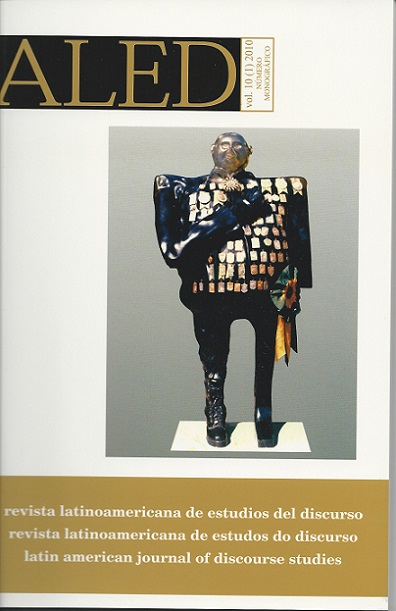Discurso y cambio institucional en el VIII Plan de la Nación del Presidente Carlos Andrés Pérez 1989-1993
Keywords:
democracy. institutional discourse. strategic functions. linguistic choice.Abstract
Between 1958 and 1988, there were very few systematic and successful attempts to diversify the Venezuelan petro-rents, and this considerably affected democracy in the late 1980s. In view of this situation and by virtue of the global changes of the time, President Carlos Andrés Pérez (1989-1993) decided to embark the country on a liberal policy as stated in his VIII Plan de la Nación (Eighth Plan of the Nation). In this regard, the objective of this investigation is to identify the strategic discursive functions and the linguistic choice in this plan of government in connection to the role that political parties and civil society are to play within the Venezuelan petroState, so that power relations might generate a system of conciliation of interests for the sake of both rulers and ruled. In fact, the government under study executed, to a great extent, economic reforms unsuccessfully for not having exerted the pertinent political reforms, namely those associated with political parties, decentralization, and Constitutional reform. The corpus of this study consists of the text of the Eighth Plan of the Nation, specifically in matters concerning the institutional change necessary to reform the State to make it more efficient, representative and democratic. In this line of thought, I set out to assess, on the basis of the methodology adopted by Paul Chilton and Christina Schäffner (2000), the extent to which strategic functions of interaction in political life and the linguistic choice in the text facilitate the aforesaid institutional change.
Downloads
References
Acosta, N. y Gorodeckas, H. (1985). La adequidad. Análisis de una gramática política. Caracas: Ediciones Centauro.
Arenas, N. y Calcaño, L. (2000). El imaginario redentor: de la Revolución de Octubre a la V República Bolivariana. Caracas: CENDES, Universidad Central de Venezuela.
Bolívar, A. (2001). Changes in political dialogue. The role of advertising during electoral campaigns. Discourse & Society 12 (1): 23- 46.
Bolívar, A. (2005). Discurso e interacción en el texto escrito. Caracas: Universidad Central de Venezuela. Primera edición 1994, primera reedición 1998.
Bolívar, A. (comp.) (2007). Análisis del discurso ¿Por qué y para qué? Caracas: Universidad Central de Venezuela ”“ Colección de Libros El Nacional.
Buchanan, J. y Tullock, G. (1967). The calculus of consent. logical foundations of constitutional democracy. Ann Arbor Paperbacks.
Cabré, M. T. (1993). La terminología, teoría, métodos, aplicaciones. Barcelona: Antártida.
Coppedge, M. (1994). Strong parties and lame ducks: Presidential partyarchy and factionalism in Venezuela. Standford: Stanford University Press.
Coseriu, E. (1977). Principios de semántica estructural. Madrid: Gredos.
Crisp, B. (1997). El control institucional de la participación en la democracia venezolana. Caracas: Editorial Jurídica Venezolana.
Chilton, P. y Schaffner, C. (2000). “Discurso y Política”, en T. van Dijk (comp.), El discurso como interacción social. pp. 297-330. Barcelona: Gedisa.
Dahl. R. (1989). La democracia: una guía para sus ciudadanos. México: Fondo de Cultura Económica.
Diamond, L. (1990). “Three paradoxes of democracy”, Journal of Democracy (1) (3). Baltimore, The Johns Hopkins University Press, pp. 48-60.
Fairclough, N. (2003). Analysing discourse. London: Routledge.
Fairclough, N. (1992). Discourse and social change. London: Polity Press.
Foucault, M. (1998). Historia de la sexualidad I. Madrid: Siglo Veintiuno Editores.
Lasswell, H. (1949). Language of politics. New York: George Stewart Publisher.
López M., Gómez C. L., y Maignón T., (1988). De Punto Fijo al Pacto Social. Desarrollo y hegemonía en Venezuela. Caracas: Fondo Editorial Acta Científica.
Martín, A. (1996). El gran viraje: auge y caída. Caracas: Ed. Buchivacoa.
Márquez, T. (1996). El Estado en Venezuela: descentralización, reforma de la administración pública y políticas contra la pobreza. Caracas: Panapo.
Mommer, B. (1988). La cuestión petrolera. Caracas: Asociación de Profesores de la Universidad Central de Venezuela ”“ Editorial Tropykos.
Naím, M. (1993). Papers tigers and minotaurs. Washington: World Bank.
Palacios, E. (2008). Mecanismos utilitarios de poder de la democracia representativa venezolana, una aproximación desde el análisis crítico del discurso. Caracas: Trabajo de ascenso, Universidad Central de Venezuela.
Rey, J. C. (1985). El futuro de la democracia en Venezuela. Caracas: Publicaciones UCV.
Romero, A. (1996). Decadencia y crisis de la democracia. Caracas: Panapo.
Romero, A. (2000). Sobre historia y poder. Caracas: Panapo.
Sabino, C. (1988). Empleo y gasto público en Venezuela. Caracas: Panapo.
Wodak, R. y Meyer M. (2003). Métodos de análisis crítico del discurso. Barcelona: Gedisa.
Downloads
Published
How to Cite
Issue
Section
License

This work is licensed under a Creative Commons Attribution-NonCommercial-NoDerivatives 4.0 International License.
The authors retain the copyright and guarantee RALED the right to be the first publication of the work as well as a Creative Commons Attribution License that allows others to share the work with recognition of authorship and the initial publication in this journal.




